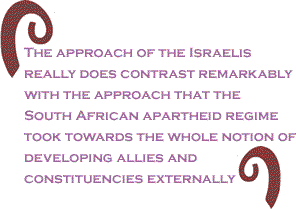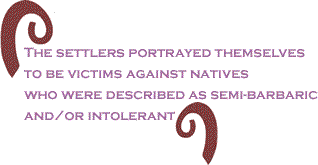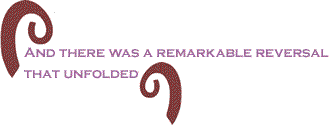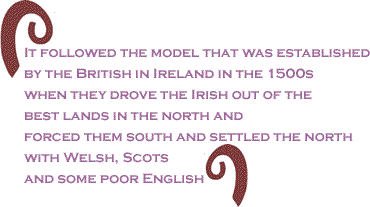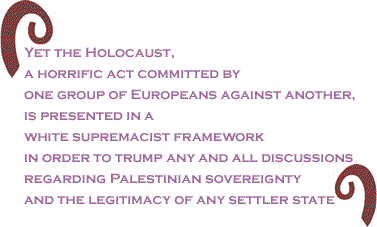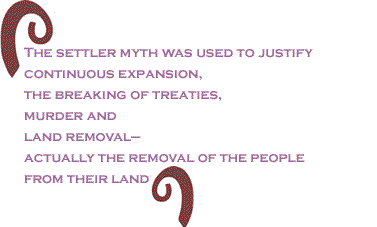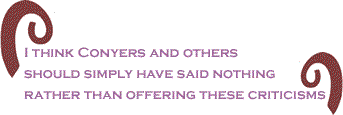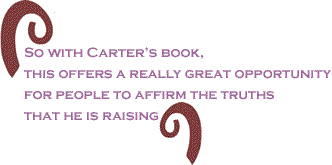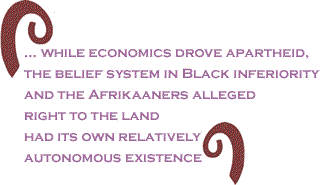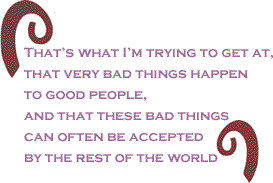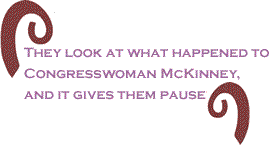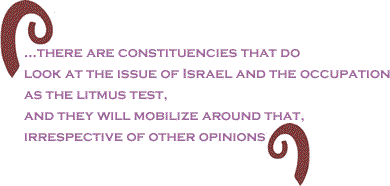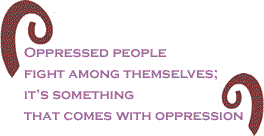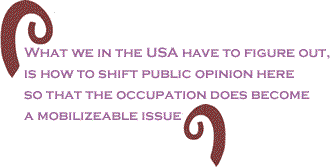
|
|||||||||||||||||||||
 |
|||||||||||||||||||||
 |
|
At a briefing at the Palestine Center in Washington, D.C., BC Editorial Board member William Fletcher, Jr. discussed the similarities and differences between Israeli-occupied Palestine and apartheid-era South Africa focusing on the logic, objectives and strategy of settler states. He also addressed the opposition to Jimmy Carter's new book, Palestine Peace Not Apartheid, and urged a continued mobilization around the issue of Palestine. Thank you and itís an honor and a pleasure to be here. When I was invited, I was asked to speak in terms of what was called ďTwo Walled Cities: Jerusalem and Johannesburg.Ē I thought that was a very good metaphor to look at the issue of apartheid and the occupation. But before but I get into that, I want to preface it by actually speaking about some differences between Israeli-occupied Palestine and apartheid-era South Africa, in fact, a very dramatic difference. Within a few months of my taking over as President of TransAfrica Forum in January 2002, I received a call from none other than the Israeli Embassy congratulating me on the appointment. This came as an incredible shock. I said to myself, do they know who I am? They then went on to propose a meeting with me to discuss a cultural program that the Israeli Embassy wished to jointly sponsor with TransAfrica Forum that focused on Ethiopian Jews. The meeting never happened. They called me and claimed that someone on their staff had gotten sick. I guess theyíre still sick because the meeting was never rearranged. But in any case, I concluded that they probably did a little investigation and just said that there wouldnít be much of a point to having the meeting.
I raise this for two reasons. One is that I never received a congratulatory call from an Arab Embassy. And this is not an attack on Arabs, but it is something Iíve noticed in terms of the unwillingness or inability to carry out outreach in the USA in order to promote an Arab viewpoint. The Israelis, on the other hand, are phenomenal in terms of outreach. The South Africans during the apartheid era were not. Iíll get into that in a second, and itís a very, very big difference in the approaches of the two countries. So the approach of the Israelis really does contrast remarkably with the approach that the South African apartheid regime took towards the whole notion of developing allies and constituencies externally. The Israelis have always had an active outreach program, and while they have consistently portrayed themselves to be victims, they have done so in a way that constantly seeks international support. Interestingly, other settler states like South Africa and Australia took a very, very different view when it came to this matter and did not, by and large, seek non-governmental constituencies, even though both of these other settler states, in their own ways, portrayed themselves as victims. The South African apartheid regime obviously had a close alliance with the United States but did not spend a lot of time trying to cultivate a relationship in the United States. The slight exception to this was the effort, backed by the Reagan administration, to promote the South African-aligned Angolan movement of Jonas Savimbi (called the National Union for the Total Independence of Angola [UNITA]) in the USA in connection with certain right-wing African American churches. Even here, however, while UNITA was aligned with South Africa, it was not the South Africans who were trying to develop a constituency in the USA. The logic of both Israel and apartheid-era South Africa can be found in their common origins as settler states. In both cases, the settlers created myths, semi-religious or explicitly religious, including that God had provided the land for them and that the land was unoccupied upon arrival, a very, very common theme in every settler state, whether itís the United States, Israel, Australia, New Zealand, Canada, etc. In both cases, the settlers portrayed themselves to be victims against natives who were described as semi-barbaric and/or intolerant. Given the permanent state of siege, every settler state aggression came to be described as a defensive act, an approach also common with the United States. By way of example, for South Africa, incursions into Angola, Mozambique, Zimbabwe or anywhere else always against alleged terrorists were justified as alleged defensive actions. For the settler state, there is a zero sum calculation when it comes to the natives. This does not necessarily mean that the natives must be annihilated, but it does mean that the natives can never be allowed to prevail. In this context, one can look at Jerusalem and apartheid-era Johannesburg as emblematic of settler strategy and the settler state as a whole. Though there are significant differences between Israel and apartheid-era South Africa, for example, the religious significance of Jerusalem, the settler approach in both cases with these cities shared much in common. In the case of Jerusalem, the entire city has been seized by the settlers who have no intention of sharing it with the Palestinians. The settler plan is one of driving out the Palestinians through a combination of intimidation and inconvenience, otherwise known as psychological warfare. By inconvenience I mean the painful difficulties encountered by Palestinians living in occupied East Jerusalem.
Johannesburg, however, was constructed to be for whites only. Blacks could enter the city during the days to work but had to clear out at nightfall unless they had explicit permission to stay. Blacks lived in what can only loosely be described as suburbs or townships, the most well known being Soweto, which is an acronym for South-West Township. Itís not a name in and of itself. Security, as in occupied Palestine, was ever present in Johannesburg and Soweto. Blacks carried passes and travel was always limited. Johannesburg stood as a top of the line First World city while townships like Soweto were Third World and often-quite marginal. The walls in the case of Johannesburg were actually around Soweto and other townships as opposed to being around Johannesburg itself. In fact, one of the remarkable things in going to Soweto is that there is only one road and gate in and out. As apartheid crumbled, so too did much of Johannesburg. Whites left the city in mass and they abandoned their often-luxurious high rises to squatters or general squalor. They retreated to their nearly always heavily militarily guarded and gated communities. And there was a remarkable reversal that unfolded. Whites would be in the city by days, and then they would be in their communities at nights. But they would not stay in Johannesburg during the evening. The apartheid plan was for the removal of blacks from the best of land. In this case, it followed the model that was established by the British in Ireland in the 1500s when they drove the Irish out of the best lands in the north and forced them south and settled the north with Welsh, Scots and some poor English. It also follows what we see in other settler states, such including the United States, Canada, Australia, New Zealand and obviously Israel. Yet each settler state has handled its indigenous population somewhat differently. In Australia, New Zealand and the United States, there was an overt effort at extermination. Case in point, there are no Tasmanians left on this planet. Not only were the indigenous removed from the land, they were removed from the living. In Ireland, South Africa and to some extent Canada, the premium was placed on the removal of the natives from the land and their socio-political marginalization. In the case of Palestine, Iíd argue, a bit of both seems to be underway, though the emphasis seems to be on the removal from land.
In both the Occupied [Palestinian] Territories and apartheid-era South Africa, the settler state wishes (or in the case of South Africa, wished) to make the situation so inhospitable that the indigenous people leave on their own. It combines violent coercion with what can be described as hassling, or what I said earlier, psychological warfare. In the case of South Africa, the apartheid regime created those fictitious homelands like the Transkei and Ciskei. These were actual large territories with limited resources and limited anything with the exception of sources of entertainment such as Sun City. The key land always remained in the hands of the whites. The Occupied [Palestinian] Territories are replicating this pattern. And just as the apartheid regime presented itself to the world as visionary by allegedly ďliberatingĒ the homelands, so too do the Israelis in their vision of a Palestinian state or statelet. The situation raises some uncomfortable strategic questions. For the black South Africans, the struggle was not one to build legitimate and self-sustaining homelands. The objective was not to take over the Transkei and Ciskei and make those viable states. It was instead to destroy apartheid and create a democratic South Africa. In that sense, itís interesting to see discussions under way in the Palestinian movement regarding the viability of the two-state solution in light of what Israeli practice has been. Finally, the Holocaust separates Israel from apartheid-era South Africa largely in terms of the perspective of the rest of the world. The treatment received by the Boers (what are now known as Afrikaaners), in the original British concentration camps during the Anglo-Boer war, may have helped to shape Afrikaaner consciousness, but it had little impact on the way that the rest of the world viewed the Boers as a people or their efforts to eventually justify the apartheid state. The Holocaust, however, shuts down much discussion. This is not helped by comments such as the contradictory and rhetorically provocative, if not stupid, statements by the Iranian President [Mahmoud] Ahmadinejad questioning the reality of the Holocaust. Yet the Holocaust, a horrific act committed by one group of Europeans against another, is presented in a white supremacist framework in order to trump any and all discussions regarding Palestinian sovereignty and the legitimacy of any settler state. The struggle against apartheid carried with it many valuable lessons for the Palestinian movement. Yet I would suggest that the struggle of the First Nations, or the Native Americans (here in the USA), also carries invaluable lessons. The First Nations in the United States and Canada were demonized, dehumanized and, ironically, romanticized by the settler state. The settler myth was used to justify continuous expansion, the breaking of treaties, murder and land removalóactually the removal of the people from their land. The settler state justified its atrocities by reference to what eventually came to be known as the ďfacts on the ground.Ē In other words, from the standpoint of the settler, it does not ultimately matter whether Ďweí, that is the settler, robbed Ďyouí of your land and dignity. ĎWe,í meaning the settler, possess all the cards. That is, the settler possesses all or most of the weapons and, therefore, from the standpoint of the settler, the game is over and, as the bumper sticker says, ďThings just happen.Ē Thank you.
Questions & Answers Q: I just wanted to ask about Jimmy Carterís book. What response itís getting, what your thoughts are about how itís written, your evaluation of it. A:† Iím just starting to read it. I think that the book is, regardless of what it ends up saying, significant due to its title. And itís incredible to see the sorts of responses, the angst that the title is creating. Like I said, Iíve only just started reading the book, and we were talking informally before this event about it. Itís striking in that the book is written in very simple language, and I assume that that means who heís targeting the book towards. But the other thing that I found interesting was that this book was more of a memoir or musings rather than a straight analysis. While reading these musings all of a sudden I realize that in these musings, heís making very profound points. He will comment to the effect that he expected the Israelis to leave at a certain point. The point seems to be made in passing but it is quite significant. I donít think thatís an editorial problem. I think he knows what heís doing in making that. So, Iím anxious to complete the book. I hope that itís good. But to me, the title makes the book worth it. Q: Speaking of the title, the book has been denounced by some political figures, but specifically Nancy Pelosi, but I was quite startledÖ A: Öand [U.S. Congressman] John Conyers Q: Öthat John Conyers wanted the title changed. Do you have connections with any of the people in the Congressional Black Caucus? And do you have any idea why John Conyers would come out with such a statement?
A: I have incredible respect for Conyers. He has been under fire for so many things and taking the right stand on so much. But I think that as November 7 approached, many of the Democrats said weíre on the verge, and we canít do anything thatís going to rock the boat. I think that these Democrats made an opportunistic decision in coming out and attacking Carter, perhaps because they believed that this would ensure that the Jewish vote did not desert the Democrats. I think it was an inexcusable act. I think Conyers and others should simply have said nothing rather than offering these criticisms. I was very troubled by that. And I have to say to some extent I was surprised. If Harold Ford had done it, I would not have been surprised. But with someone like Conyers, I just didnít expect it. I think we have to criticize him. He needs to hear from his friends. He hears enough from his enemies. I think he needs to hear from his friends that this was really off the wall. This was wrong; you donít do that. Iíve said enough. Q: I guess this is not so much a question as a comment following up on what you were just saying. I think the press and the public needs to hear from all of us that we get what Carterís talking about and what you were just talking about. These thoughts arenít apparitions on the fringe but are out there. The facts are out there. The parallels are out there. People need to be talking about it because unless we talk about it openly, actively, often, you get it marginalized. A: I think that thatís absolutely right, which means we need to have far better Ďecho chambersí than we do in general, but certainly on the issue of Palestine. Itís not enough to have a nice op-ed in the Washington Post once every blue moon. We have to think of a real strategy that looks at different elements of the media, such as when to engage in talk shows [and] which kinds of talk shows. I, for example, write extensively in the African American news media and a number of the issues that Iíve written about concern the Middle East. Generally, I get a very good response. We have to be thinking about that. Thereís a whole ring of smaller newspapers that are very often looking for copy. I know that might sound very opportunistic, but theyíre looking for copy. So, we need to be thinking about how do we get the message in there and how do we repeat certain things. So with Carterís book, this offers a really great opportunity for people to affirm the truths that he is raising. This all has an impact. Iím convinced, particularly when I looked at the poll numbers in response to the Israeli invasion of Lebanon that were much more complicated than we were led to believe in terms of the United States, that we actually can shift opinion.
Q: I have a question about the comparison, Bill, the Israel-South Africa thing. But first I just wanted to make one comment about the public opinion and Conyers issue. Like you, I have enormous respect for Congressman Conyers, and Iíve worked closely with him. I was terribly, terribly disappointed, and I do plan to talk with him directly about it. But I also think we have to recognize that the reason this sort of thing happens is because of us and what we havenít done enough of over the years, which is to make clear that the constituencies out there believe that Israel is an apartheid state, believe that Palestinians are living under occupation based on an apartheid principal. We havenít made that position clear enough so that somebody like Congressman Conyers, who is a man of principal, but is also very concerned about not only winning the election, which was never an issue for him, but about getting his position as the chair of the Judiciary Committee, something very important for all of us, that thereís no downside that he can point to for why he shouldnít say that because weíre not enough of a political force, supporting members of Congress, supporting various other parts of the political system, as well as doing the work with the media. So I think that this point about our obligations is a very important part when we talk to people like Congressman Conyers, when we criticize them. We have to do it with a great deal of humility and recognition of our own failures for having not created a situation where it would be impossible for someone like John Conyers to say something like that. My question though is on the issue of the economics of apartheid. I was in South Africa a couple of months ago and talking with a lot of people involved with the Palestine issue there. And one of the things that they were talking about that they realized around the world, the opposition to apartheid often did not include an understanding that apartheid was fundamentally an economic system [and] that the racism of it was something imposed to make possible certain economic gains in terms of control of land and labor. And we see that in a very similar way in Israel and Palestine. So I wonder if you could talk a little more about, you hinted at it, Bill, when you talked about the land issue, but if you could get a bit more into that of what the parallels are and what the differences might be on the economics of apartheid in both. Thank you. A: Iíll try. I think that thereís a reason that at least in the United States, many people didnít quite get the economic issue. It has to do with the Cold War, and it has to do with the fact that at the end of WWII, there were people, like [W.E.B.] DuBois and [Paul] Robeson and others on the Council of African Affairs, who were very clear about what the nature of the soon to be apartheid state was going to be in South Africa, what the colonial situation was there [and] what the objectives were. But with the Cold War, such discussions were crushed, discussions of racism reverted to discussions that revolved much more around psychology or genetics rather than understanding it systemically. So people would focus on the racism of the apartheid regime, and obviously there was good reason for that but not looking at the class factors that were involved there was itself a problem. That said, I think I probably would frame it somewhat differently.
The South African apartheid system had a semi-autonomous, ideological structure that not only saw the need to remove the Africans for economic reasons but truly believed that the Africans needed to be removed and would have, in my opinion, been quite prepared to use biological warfare and nuclear weapons against the black majority if things came to that. I donít think they would have held back, and my sense is that thatís what the ANC [African National Congress] realized at a certain juncture. Neither the African National Congress [ANC] nor the Pan Africanist Congress [PAC] of Azania were going to be able to militarily win or defeat the South African apartheid state, but neither was the South African apartheid state going to be able to militarily defeat the black majority. I am raising this just to emphasize that while economics drove apartheid, the belief system in Black inferiority and the Afrikaaners alleged right to the land had its own relatively autonomous existence. As such, the apartheid state could very well have taken steps toward the active annihilation of the Black majority. This is also what I worry about deeply in Israel and Palestine. There are economic objectives that are there in terms of seizing the land and getting the best land. Itís true in Ireland as well. But the Israeli state is a rabid and racist state, and I donít think that we should ever assume that they wouldnít do something maniacal, like unleashing a nuclear weapon, if they felt that their backs were to the wall or that they had a legitimate right of self-defense, regardless of the consequences. I think they would do so with the assumption that the United States would support them. So I definitely think that you are right, but I also think that it is important to emphasize that within the state structure, forces there also believe the ideology of the settler state. It is not all Ďspin.í The capitalists that may be behind them may not give a damn one way or another, but within the state structure Iím absolutely convinced that they believe in that system. In South Africa, they believed in the apartheid system; they believed in the notion of white supremacy. Q: With regard to the Democrats, I wanted to say that I think that this tactical approach of saying what certain constituencies want to hear is not only immorally so wrong, but I think itís also not a smart approach. I think for all those Jewish people who would not vote for the Democrats, there are a lot of other people who donít vote at all because they are so disgusted that nobody says really what they think out of these tactical considerations. I didnít read Jimmy Carterís book, but Iím so glad that he kind of broke the ranks and had the courage to stand out there and of course really step in the mud, so to speak. The other thing I wanted to ask you, you said that the Palestinians could learn from the First Nations in America. I would be interested to hear what exactly you meant as sometimes I think that actually the Native Americans pretty much live in Bantustans around this country still, and nobody talks anymore about them. They are a forgotten people, and we all too often forget that they are there, actually, in these reservations. We donít hear too much about them anymore. A: And what I meant was learn from their experience, but thatís precisely whatís happened. Theyíve been driven to near annihilation and marginalization by this notion of the ďfacts on the ground.Ē That may have been coined by whoever in the Israeli government, but in reality it was probably coined by white American settlers to describe the reality of ďthe Indians are gone.Ē Maybe we did murder them; things happen. Thatís what Iím trying to get at, that very bad things happen to good people, and that these bad things can often be accepted by the rest of the world. That was my major point.
With regard to your first point, while I agree with you in principal, in this last election, there was an apparition that was floating behind every member of the Congressional Black Caucus, and the apparitionís name was [U.S. Congresswoman] Cynthia McKinney. When one says well if Congressman Conyers had taken the right stand other people would have supported him, I am not sure that they would have. Iím not justifying the statement by Congressman Conyers. What Iím saying, to build on what Phyllis raised, is that pro-Palestinian constituencies have to realize that thereís no room for lethargy. Remember that the other side went after Cynthia McKinney. Now Cynthia McKinney had a number of her own problems, donít get me wrong. But one of the things that was clear in the first election she lost and then in the second was that Zionist elements wanted her out, and they were prepared to mobilize and support people that would go against Congresswoman Cynthia McKinney. Congressman Conyers is no fool, and the other members of the Congressional Black Caucus arenít either. They look at what happened to Congresswoman McKinney, and it gives them pause. Thatís the problem. And so until and unless we have the kind of constituencies that really can come to your defense and are prepared to mobilize, send in money and send in volunteers, it is all wishful thinking. Q: My question is, my comment rather, is that I think itís more to do with the elite opinion and the mainstream media than about constituents. If you look at the polls, the majority of the American people supports a two-state solution, which U.S. and Israel have been blocking for the past 30 years outright. But whenever any Democrat may say something that is critical of the state of Israel, I think he has concerns which are less to do with constituents, this is my opinion, and more to do with this media machine which comes into action as soon as someone tries to be a little bit critical of Israel. So, itís more of an elite opinion than of the popular opinion.
A: I actually think itís both. The thing is, you have to be very careful with polls. I think Iíve seen similar polling information. The fact that the majority of people in the United States support a two-state solution only means something if theyíre going to vote that way at election time. Otherwise, itís simply an opinion. So, what matters is the capacity of the other side to mobilize and destroy you. That is what really counts. For example, I could say to you, do you support East Timorís right to self-determination? And youíd say yes. Now, letís say that Indonesia attacks East Timor again. Are you going to get mobilized around East Timor? Maybe, maybe not, right? It depends on how critical an issue you see that, not simply your opinion, but whether it is, for you, a mobilizing issue. And I think that what we have to recognize is that there are constituencies that do look at the issue of Israel and the occupation as the litmus test, and they will mobilize around that, irrespective of other opinions. They will get out and vote; they will mobilize their constituency. So thatís where this issue of polling becomes very complicated. While the issue of the media is important I think that we have to remember the point made by Machiavelli to the effect that a determined small number of people can always defeat a mob. The mob can outnumber that small group a hundred-fold, but the mob, by definition, has no organization. The determined small group knows exactly what it wants to do. Q: I wanted to ask about Jimmy Carterís book which is getting lots of whatever, but the moment you get that discussed and then the same evening you see shootings in Gaza between Hamas and the PLO, it seems to, when I say dilute, it sort of pushes off the table anything that Carterís possibly saying. That seems to happen over and over again and then you have intemperate words by Hamas, and as you said, Ahmadinejad. I donít entirely see a way until, at least within Gaza, Palestinians find a way to not kill each other so that they donít have themselves on the news cycle and until they learn better PR, at least, I donít see how youíre going to ever make any kind of progress.
A: Oppressed people fight among themselves; itís something that comes with oppression. Black folks will always talk about how weíre disorganized, we canít get anything together, we fight each other, crabs in a barrel, etc. Years ago, I was talking to this Irish guy, an Irish immigrant. He was doing some organizing of Irish and Irish Americans in Boston and he said, ďItís pointless! You know how Irish are, Bill,Ē and I said, ďActually I donít know how they are. How are they?Ē He says, ďWe canít organize anything. Weíre always fighting!Ē And I just broke into hysterical laughter at that point, and I said, ďWell every group is saying that, right?Ē And part of that is that part of the impact of oppression is to have us at odds. So, we have to accept that thatís going to happen. Thereís never a united situation, a permanently united situation. Even in the example you gave, what I really thought about was what was happening in the mid-80s in South Africa with the rise of the Inkatha Freedom Party and the way that the apartheid government was using the Inkatha Freedom Party and the homeland governments as a way to move against the ANC and PAC. Clearly part of the objective there was to lead to despair, not simply to crush the ANC and the PAC but to lead people to come to the conclusion that this is just a mess; that there is no positive result that can come out of that. I think we here in the USA are Fateh and Hamas. I think what we lack here is enough organizational coherence and a broad enough front to basically say that the Palestinians are going to have to settle certain things themselves. What we in the USA have to really hit at is the question of the occupation. And so when we get sort of distracted or derailed away from that question, I think itís our job to keep coming back to that, otherwise weíre going to be waiting for a situation that will either be resolved when one or the other group in Palestine eliminates the other one or where they actually do come up with a united front. I donít think politics works that way. I donít think that we can wait. I share your concern, but I think we have to press forward.
Q: If you were to use a sound bite to compare apartheid South Africa to apartheid Israel, what would it be? A: A sound bite? Do I get a prize? Iíd have to really think about that. When I envision in my mindís eye apartheid-era South Africa and the Occupied [Palestinian] Territories, the first thing that comes to mind is land-removal, that is removing people from the land, the expulsion of people from the land. Iíd have to work that into a sound bite, but thatís what comes to my mind, removing people from their land. And part of what I then start thinking about is urban renewal in the United States. I start thinking about Katrina. I start thinking about what happened in the Trail of Tears with Native Americans in the early part of the 19th century. Q: Iím with Washington Interfaith Alliance for Middle East Peace and we do a lot of work with primarily churches but also to some extent also the Jewish community and mosques, but I have a deep frustration that maybe you could help us out on. In all the years that Iíve worked on this, I have virtually made no in-roads whatsoever in the African American churches here. I know bishops. I know ministers. I know a lot of people. Iím well connected to them. They always express tremendous sympathy, but when I ask well can I come to their churches, they basically say no because they actually say theyíre really pro-Israeli. And Iím talking about liberal churches. I wonít name churches, but Iím a Methodist and thereís some very liberal, black Methodist churches and even they wonít have me speak. So, it really bothers me that we canít even talk to the African American church on this issue. Could you give us some suggestions about how we could approach them? A: There was something that we were trying to get off the ground at the TransAfrica Forum, and I still think itís necessary, which I called an African American Council on Palestine. We just couldnít get the funding, but I remain convinced that thatís whatís necessary. There needs to be a dialogue within black America that we initiate, that says, ok letís talk about Palestine. There is a long history of support for the Palestinians among black Americans, and black Americans have taken incredible hits for supporting the Palestinians, whether it was SNCC (Student Non-Violent Coordinating Committee) in the 1960s, the Panthers or any number of other groups that were outspoken in supporting Palestinian national liberation. So itís not that thereís no base. Itís gotten complicated by both the fear of being stomped on by the Zionists, and itís been also complicated by some elements of theology. And so I think that we actually have to engage in a theological debate. People that really are theologians need to take up this question. But the more fundamental thing is that I actually think that an African American Council on Palestine would probably be fairly successful in being able to at least open up a dialogue.
Q: Let me just follow up on the comments that you made regarding this question. Iíll give you an example, way back in 1969 or í70, the British section of Amnesty [International] sponsored a study in the occupied area of Gaza. The conclusion of that study was that Israeli military had tortured Arab prisoners in the occupied area of Gaza. When that particular report was published, itís estimated that more than half of the Jewish members of Amnesty in Britain had resigned. A fellow member of the board, I was on the board of Amnesty at that time, had resigned as well under some spurious reasons. Excerpts of that report [were] published in the newspaper, The Guardian, the strong supporter of Amnesty International. When those excerpts showed up in The Guardian, large firms like Marks and Spencer stopped advertising in The Guardian. This is how they used economic clout in order to suppress a dissenting opinion or adverse opinion of Amnesty. Since then, if you open any book on Amnesty, you hardly see the comments on that particular episode or even that particular report. A: None of that surprises me. The problem is we have to be very careful with this question about the media and about money. We, on the progressive side of the aisle, are never going to control the media, and weíre never going to have the money that the enemy does. We arenít. That really is the bottom line. Weíve got to figure out an alternative way of undermining the other side, and I think youíre right. There are tremendous consequences when people speak up. Thereís no question about it. Many of us have lost jobs or not gotten jobs or whatever because weíve been willing to speak up. But again, we donít have a Ďbase area.í Itís great that everyoneís here, and Iím glad that everyone is here, but itís not like if any of us walks out and we are the victim of some sort of attack, and I donít even mean a physical attack, that we can count that there will be a real mobilization. I think we have to think differently about politics.
Let me just say one other thing going back to an earlier point. Iíve made this comment before, and I donít want it taken in any way as disrespectful, but I have felt for a very long time with regard to the issue of black America that Palestinians donít spend enough time with black Americans whereas the Israelis do, as I mentioned earlier. Consider this. Black trade unionists will be invited by the Histadrut to go visit Israel. The Histadrut will pay for it, theyíll make sure they get a tour, and if you want to see the Palestinians, they will make sure that the visitors get at least 30 minutes to visit them. There is nothing like that on the other side. Israelis will make a point of meeting with so-called mainstream civil rights leaders. We need Palestinian leaders to do the same thing, to do the rounds, to go from city after city after city and sit down with the key African American leaders, to hear what their questions are, to debate some of these theological questions. If that doesnít happen, there will always be a core within the African American community that, no matter what, will support Palestinian national liberation. Itís not fringe; itís definitely not fringe. Itís not organized, thereís a big difference. At least from my travels and the travels of other people I know, itís significant. But it goes back to the point you and I were talking about, about mobilizing a constituency. People may feel strongly, but whether they will mobilize, thatís the critical thing. So I just think we have to look at strategy differently. Q: I had the good fortune of having visited South Africa a few years ago, and I was struck by the extent to which there had been such a dramatic transformation in only ten years of post-apartheid regime there. What was really telling to me was, in many respects, it seems as if there had been more integration of different races in South Africa than even here in the United States currently. Iím curious from your perspective to what extent do you think there can be, not to downplay the tremendous problems that still exist in post-apartheid South Africa, but to what extent do you think that there can be a similar type of a political and social transformation in Israel/Palestine? More importantly, how are we going to get there? Because I canít see it right now, how weíre going to get there. A: I think, in terms of your first point, the situationís very complicated. South Africa remains, I believed, the most polarized country on the planet wealthwise. It remains very segregated. You go to what I consider the most beautiful city in the world, Cape Town, and just driving from the airport toward downtown, you see three different worlds. On the right-hand side, you see where the so-called blacks live in these shanties. On the left side, you see where the so-called coloreds live, and the houses are better than shanties. But straight ahead, you see paradise, and thatís where the whites live. And what has happened is that there has been the rise of a kind of black professional managerial group as well as some black capitalists, but the economy is still controlled by whites. The political system is dominated by blacks and dominated by the ANC. I think that the ANC has not done enough, actually. What I find fascinating is the patience that the South African people have for change because so many of them really do live in miserable conditions. The South African government embraced neo-liberalism, which helps us to understand that many of the changes that one would have hoped for necessitate a challenge to the very class interests of the new rulers. In that sense, South Africa truly needs to complete the revolution that was started. If the ANC doesnít get ahead of the curve, the situation will inevitably blow up. You already see this with the issue of land. There was more sympathy with [Zimbabwe President Robert] Mugabe than many people wanted to admit in terms of the seizing of the land in Zimbabwe and the way that that was done. Much of this sympathy has dissipated because President Mugabe has gone over the top. Within South Africa, thereís a lot of anger about the question of land redistribution.
In terms of Israel and Palestine, I donít know;
I really donít. I have no idea. I do think that thereís this
question, which I was referencing towards the end, this issue
about whether itís a two-state solution or not. Thatís a very
big question, because in South Africa, essentially what the Inkatha
Freedom Party wanted to do, and Iím not trying to cast any aspersions
with regard to Palestine, the Inkatha Freedom Party wanted to
take over one of those homelands, specifically KwaZulu Natal.
Thatís what it wanted to do, and it wanted to be the legitimate
leaders of that homeland. There were fights in several of these
so-called homelands, including within KwaZulu Natal between the
forces of the Inkatha Freedom Party, the ANC and the PAC. Neither
the ANC nor the PAC ever accepted those homelands. They realized
they were simply not viable and that it was really an all or
nothing. I think that the Palestinian movement is confronted
with a very real, a very similar situation. I donít know what
a viable Palestinian state looks like right now and I do not
know whether the two-state solution is any longer viable. That
is a matter that will have to be decided upon by the Palestinian
movement and not by North Americans. What we in the USA have
to figure out, however, is how to shift public opinion here so
that the occupation does become a mobilizeable issue. This ďFor the RecordĒ transcript may be used without permission but with proper attribution to The Palestine Center. The speaker's views do not necessarily reflect the views of The Jerusalem Fund. |
|
| Home | |
| February 8, 2007 Issue 216 |
||||||||||||||
|
||||||||||||||
| Printer Friendly Version in resizeable plain text format | ||||||||||||||
 |
||||||||||||||
|
||||||||||||||
 |
||||||||||||||
 |
||||||||||||||
 |
||||||||||||||
| |
||||||||||||||
| |
||||||||||||||






















